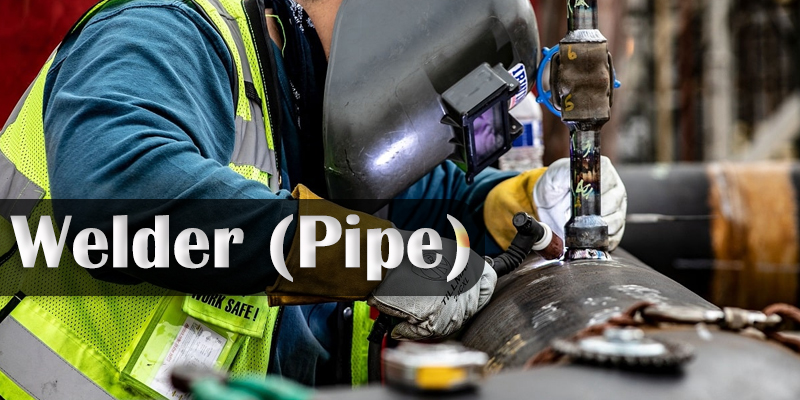
ITI Welder (Pipe) Syllabus (English)
Course Overview
-
Trade Name: Welder (Pipe)
-
Duration: 1 Year (2 Semesters)
-
NSQF Level: Level 4
-
Eligibility: 10th Grade Pass with Science and Mathematics
-
Objective: To train candidates in welding techniques for pipes using processes like SMAW, GMAW, and GTAW, preparing them for roles as pipe welders, fabricators, or self-employment in industries such as oil and gas, construction, and power plants.
-
Certification: National Trade Certificate (NTC) by NCVT
Detailed Syllabus
Semester 1
Trade Theory
-
Introduction to Pipe Welding: Importance of pipe welding, applications in oil, gas, and water pipelines.
-
Safety Practices: PPE (welding helmets, gloves, boots), fire hazards, confined space safety, ventilation.
-
Welding Processes: Shielded Metal Arc Welding (SMAW), basics of GMAW and GTAW for pipes.
-
Pipe Materials: Carbon steel, stainless steel, alloy steel; pipe schedules (Sch 40, 80), sizes (2-12 inches).
-
Welding Electrodes: Types (E6010, E7018), electrode selection, storage, and handling.
-
Pipe Joints: Butt, socket, fillet; joint preparation (beveling, gap setting ±1 mm).
-
Basic Metallurgy: Heat-affected zones, weld imperfections (cracks, porosity), distortion control.
Trade Practical
-
Safety Drills: Wearing PPE, practicing gas cylinder handling, confined space entry protocols.
-
SMAW Setup: Setting up arc welding machine, adjusting current (80-150A for 3.2 mm electrodes).
-
Bead Welding: Depositing beads on flat plates, ensuring uniform width (±1 mm).
-
Pipe Joint Prep: Beveling pipe ends (30-37.5°), setting root gaps, cleaning surfaces.
-
Butt Welds: Welding 4-inch carbon steel pipes in 1G (flat) position, achieving full penetration.
-
Inspection: Visual checks for undercut, slag inclusion, measuring weld bead consistency.
-
Project Work: Weld a 4-inch Sch 40 pipe butt joint using SMAW, ensuring defect-free root pass.
Hours: Theory: 160 hours | Practical: 240 hours
Semester 2
Trade Theory
-
Advanced Pipe Welding: GMAW and GTAW for pipes, multi-pass welding, root and cap passes.
-
Welding Positions: 2G (horizontal), 5G (fixed), 6G (45° incline); challenges and techniques.
-
Pipe Alloy Welding: Stainless steel, low-alloy pipes; filler selection (ER308, ER70S-6).
-
Non-Destructive Testing: Radiography, ultrasonic, dye penetrant; interpreting weld quality standards.
-
Codes and Standards: ASME Section IX, API 1104; welding procedure specifications (WPS).
-
Maintenance: Servicing welding machines, replacing torch liners, cleaning gas nozzles.
-
Entrepreneurship: Starting a pipe welding business, trends in pipeline fabrication.
Trade Practical
-
GTAW Welding: Welding 2-inch stainless steel pipes in 2G position, ensuring clean root pass.
-
GMAW Practice: Multi-pass welding on 6-inch carbon steel pipes in 5G position, maintaining arc stability.
-
6G Welding: Welding 4-inch pipes in 6G position using SMAW/GTAW, achieving uniform cap pass.
-
Alloy Welding: Welding stainless steel pipes (3 mm wall), using correct filler and argon shielding.
-
NDT Simulation: Conducting dye penetrant tests, identifying surface defects on welds.
-
Equipment Care: Replacing GTAW torch electrodes, calibrating gas flow (8-12 L/min).
-
Project Work: Fabricate a 6-inch pipe assembly (T-joint, 6G position) using SMAW and GTAW, meeting ASME standards.
Hours: Theory: 160 hours | Practical: 240 hours
Additional Components
-
Workshop Calculation and Science
-
Calculations: Weld bead volume, electrode consumption, heat input, pipe wall thickness.
-
Science: Arc physics, thermal expansion, gas shielding effects.
-
Hours: 80 hours/year
-
-
Engineering Drawing
-
Drawings: Pipe joint designs, weld symbols, piping isometric drawings.
-
Hours: 80 hours/year
-
-
Employability Skills
-
Communication: Reading WPS, coordinating with inspectors, client discussions.
-
IT Literacy: Using welding software, digital NDT reports, online material databases.
-
Soft Skills: Time management, teamwork, resume writing, interview preparation.
-
Hours: 60 hours/year
-
Assessment and Certification
-
Exams:
-
Theory: Written exams per semester (MCQs, descriptive questions).
-
Practical: Welding pipes in various positions, joint preparation, NDT inspections.
-
-
Evaluation Criteria: Weld strength, penetration, defect-free joints, adherence to codes.
-
Certification: NCVT National Trade Certificate (NTC), globally recognized.
Career Opportunities
-
Employment: Pipe welder, fabricator, or quality inspector in oil and gas, power plants, or construction industries.
-
Self-Employment: Welding contractor, pipeline repair services, custom fabrication shop.
-
Further Studies: Diploma in Welding Technology, certifications in advanced NDT or API standards.
Trade Type
- 10 views